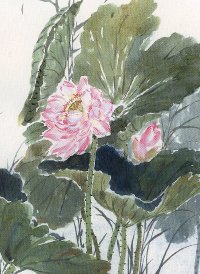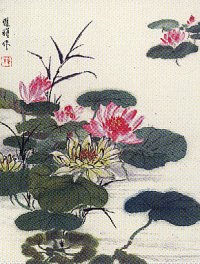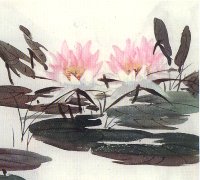Part 8 - Seven
Parables (II)
7.3 Parable of the Rain over Medicinal Herb
7.3.1 Original Text in the Sutra
7.3.2 Precis of the Parable
7.3.3 Analogies
7.3.4 Expedient Dharma
7.3.5 The Conditions of Being a Man
7.3.6 Conclusion
7.4 Parable of the Transformed City
7.4.1 Original Text in the Sutra
7.4.2 Precis of the Parable
7.4.3 Analogies
7.4.4 Cultivating our Mind
7.4.5 Conclusion
7.3 PARABLE OF THE RAIN OVER MEDICINAL HERB
It is spoken for people who practice Bodhisattva only, but look down upon those in small vehicle.
7.3.1 Original Text in the Sutra
Please click to read the extract in Chapter 5.
7.3.2 Precis of the Parable
 A
thick cloud spreads out covering the whole world and raining on all
kinds of plants with different sizes, as well as medicinal herbs.
From the rain of the one simple cloud, each plant grows, blossoms
and bears fruit according to its nature. Although they grow from the
same ground and are moistened by the same rain, all the grasses and
trees remain different from each other. A
thick cloud spreads out covering the whole world and raining on all
kinds of plants with different sizes, as well as medicinal herbs.
From the rain of the one simple cloud, each plant grows, blossoms
and bears fruit according to its nature. Although they grow from the
same ground and are moistened by the same rain, all the grasses and
trees remain different from each other.
7.3.3 Analogies
- All being moistened by the rain from one great cloud � The Buddha manifests in the world like a great cloud
covering the world with its gods, humans and Asuras, just like different kinds of plants in the three thousand great
thousand world. The Buddha speaks of the Dharma equally for all, whoever is intelligent or stupid, noble or lowly.
- All being benefited as moistened by the same rain � The Buddha contemplates the sharpness and dullness of the
faculties of the living beings, their vigor or laxness, according to their capacity, speaks the Dharma for their
sakes in limitless varieties, causing them all to rejoice and quickly attain good benefits. The purpose of speaking
Dharma to others is, of course, to let the audiences understand it. Thus, the Buddha does not speak what he certified
during enlightenment, but what the audiences can understand and accept, so as to lead them to the Buddhist Way according
to their capacity. The speaker must know clearly the thoughts and reacts accurately to the responses of the audiences.
We are dumb if we do not speak what we should speak. We are blind if we speak what we should not speak. In speaking
Dharma, it does not mean that the deeper is the better. The value of a talk depends on how far the audiences can
understand.
The Buddha is regarded as the King of Dharma, as what he speaks is convincing and beneficial to all sentient beings.
7.3.4 Expedient Dharma
 The
Buddha speaks of the expedient Dharmas for the benefit of different
kinds of people. The
Buddha speaks of the expedient Dharmas for the benefit of different
kinds of people.
- To cultivate diligently in upholding the precepts, meditation wisdom, and to eradicate greed, hatred and delusion �
We have to study Buddhism step by step. The Three Studies is the basic one, i.e. to uphold the precepts, to meditate
and to attain wisdom. For precepts, they are generally the rules for the human beings to observe and uphold in our
daily lives. Before we become Buddha, we have to be good human beings first. Thus, we have to uphold the precepts
for the human beings. Beings a good person, we have to love ourselves before we love others.
We always ignore ourselves as a lovely person, thus our human relationship with others is not very good. We have
to behave ourselves, and care others, then we will be respected and loved. We cannot hurt ourselves both physically
and mentally.
- To liberate ourselves as well as others, we should educate ourselves and break off all afflictions, including greed,
hatred, delusion, arrogance and suspiciousness. Moreover our afflictions can be easily infected to others. The
incident that we are offended by others, may be very short in time, however, it may leave a vexed impression in our
mind for a very long time. So, it is better to accept and forgive others, just as we accept and forgive ourselves.
How can we free from trouble? We have to understand the Principle of Causality and Effect. Our mind must be board
without caring the gain or loss. No one can be successful and fortunate all the times. Don�t be angry if we lose.
Don�t be excited if we win. To worry for material life is like to dig the grave for ourselves!
7.3.5 The Conditions of being a Man
- Be compassionate � In Buddhism, compassion is unconditional, while worldly love is conditional and selfish.
- Be justice � treat people equally without any bias, and do not take advantage of others. We are responsible to
ourselves ethically.
- Be moderate � we have the physical desires and the mental habits, which must be controlled. We should overcome
our emotion by asking ourselves. Is it harmful to ourselves and others? Does it violate with the perfection of our
personalities? Is there any adverse effect etc.? Is it worthwhile to have momentary pleasure which may lead us to a
life time vex? We scold others in a few seconds, however, it may hurt them for the whole life. Is there any anything
more constructive as a substitution?
- Be careful in speech � speech is used to express our mind, which can please others, but also hurt others, so be
careful!
7.3.6 Conclusion
The Buddha speaks the Dharma to all sentient beings equally. He knows their capacity, their thoughts and their
habits, so that he teaches them with corresponding Dharmas of different forms, nature and functions, so that they
can benefit.
7.4 PARABLE OF THE TRANSFORMED CITY
The parable is spoken for the people who practice Dhanya, i.e. meditation. They enjoy in the state of quiscence
and regard it to be Nirvana in pursuing the Buddhist Way. Generally, they have good "seed" of the Great
Vehicle in their past lives, but cannot "germinate" in the present life.
7.4.1 Original Text in the Sutra
 Please
click to read the extract
in Chapter 7. Please
click to read the extract
in Chapter 7.
7.4.2 Precis of the Parable
A wise guide led a group of people, who wished to travel along a
long, steep and dangerous road to reach the jewels cache. In the midway,
some people were tired and afraid, thus wanted to turn back. The guide,
through his power of expedient devices, transformed a city in the
centre of the dangerous road. Then, he said to the group that they
could stay in the city for happiness and peace, or they could proceed
to the jewel cache after a while. The group entered the city thinking
that they had already been saved at peace. Then, the guide made the
city disappear, and told the group that the jewel cache was near,
and the city was just transformed for them to take a rest.
7.4.3 Analogies
- The wise great guide on the road. He is the Buddha, who knows the living beings should leave and cross over
the evil road of the torments of birth and death which is so steep, difficult and long .
- The group was slackened and frightened � We sentient beings have strong desires to pursue in material life.
When we are urged to proceed with studying Buddhism, we are scared and then slackened.
- The guide transformed a city � The Buddha knows that the sentient beings may not be patient enough in
cultivating Buddhahood. In order to lead them and encourage them, he establishes different vehicles, so that
they can enjoy the benefits in their daily lives during different stages of cultivation.
- The transformed city vanished � The people enjoyed their lives in trouble-free transformed city. However,
understanding that the benefits from those vehicles are not ultimate and permanent, so the Buddha extinguished
the transformed city and encouraged to proceed with the Buddhist Way.
7.4.4 Cultivating our mind
All our thoughts are originated from our past experiences and impressions and from our expectation to grasp
and the desires to do something in future, thus we have attachments and worries. If we ignore these false
thoughts and suppress our desires, they will vanish in a moment. If we chase after them and allow our
desires to intensify, we will sink into the sea of suffering, and cannot liberate ourselves from the cycle of
birth and death.
In order not to be deluded and vexed, we have to cultivate our mind. Our mind will bring us in peace and
calmness and enlighten us with wisdom. To cultivate the way, we must meditate. Meditation is not merely sitting
without thinking. Wisdom is not merely studying sutra. It should be both, i.e. cultivating our mind to purify it,
and studying Buddhist sutras to understand its truth.
There are generally two processes in meditating (1) to stop the upcoming of any thought (2) to contemplate the
truth and reality. Though the false thoughts will come in our mind automatically in the beginning stage of
meditation, they will fade out after a certain period of training in mediation. Then, by contemplation we learn
that life is just like a dream and an illusion, as it is not permanent. We gradually visualize the fundamental
substance and its nature. Nature is inconceivable. That can be conceived is out false thought.
7.4.5 Conclusion
In the parable, the Buddha advises us to certify and realize the Arhatship (to reach the transformed city),
and to liberate ourselves from birth and death. However, we should not cling to the joy of comfort and freedom,
but continue to proceed with the journey towards Buddhahood. We should give up the Arhatship, and practice to be
Bodhisattvas. First of all, we must be kind and compassionate to all sentient beings. We should get close to the
sentient beings and understand them. We should share our experience to liberate them. The ultimate way to liberate
ourselves is to liberate others.
|



 A
thick cloud spreads out covering the whole world and raining on all
kinds of plants with different sizes, as well as medicinal herbs.
From the rain of the one simple cloud, each plant grows, blossoms
and bears fruit according to its nature. Although they grow from the
same ground and are moistened by the same rain, all the grasses and
trees remain different from each other.
A
thick cloud spreads out covering the whole world and raining on all
kinds of plants with different sizes, as well as medicinal herbs.
From the rain of the one simple cloud, each plant grows, blossoms
and bears fruit according to its nature. Although they grow from the
same ground and are moistened by the same rain, all the grasses and
trees remain different from each other. The
Buddha speaks of the expedient Dharmas for the benefit of different
kinds of people.
The
Buddha speaks of the expedient Dharmas for the benefit of different
kinds of people. Please
Please